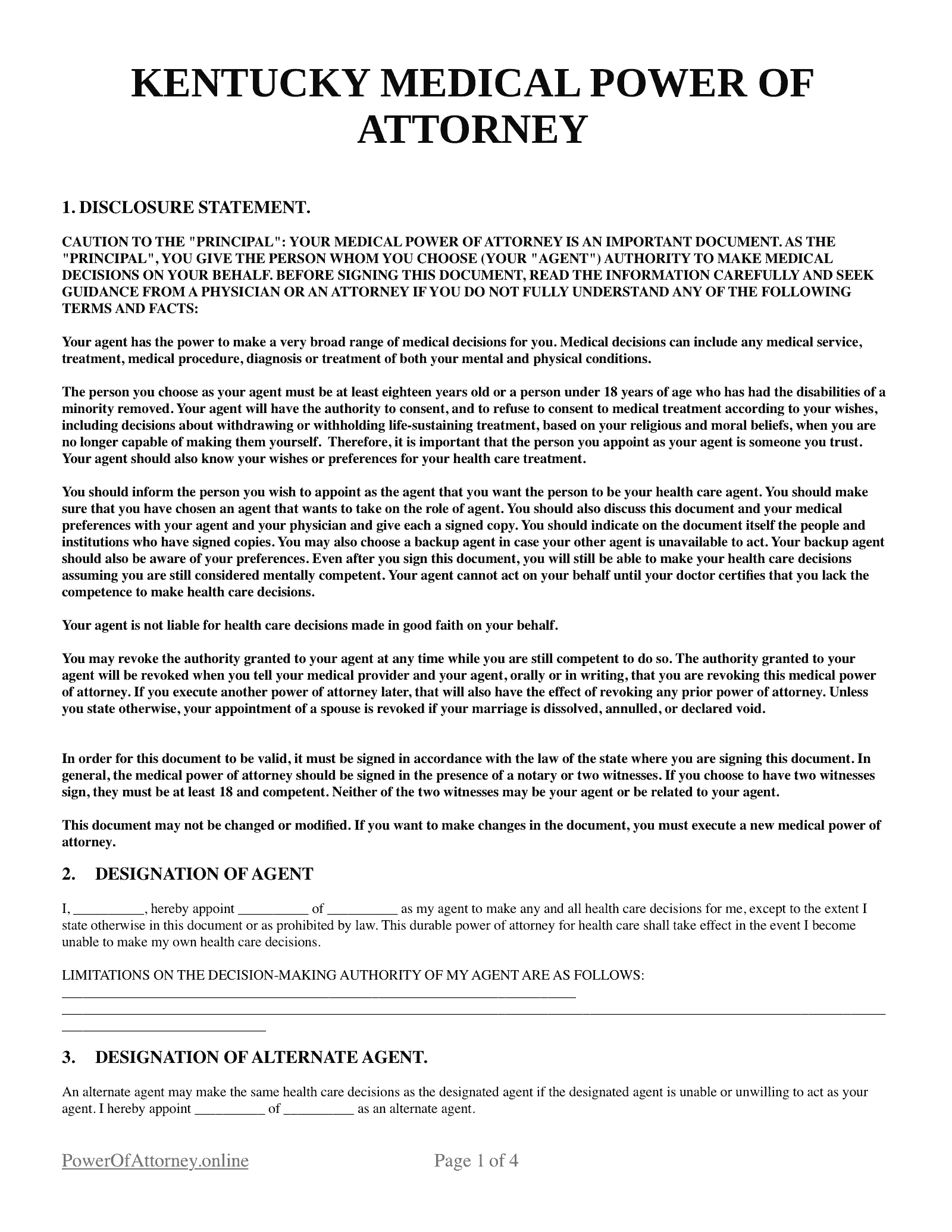Free Kentucky Medical Power of Attorney Forms
A Medical Power of Attorney (MPOA) is a legal form where an individual (the "principal") grants another (the "agent") permission to make health-related choices for them should they become incapacitated or unable to convey their desires.
This guarantees that medical choices resonate with the principal's wishes, even when they can't express them.

Kentucky Medical Power of Attorney Laws
Specific provisions in Kentucky Law outline the nature of an MPOA in Kentucky and its legal application.
- Power of attorney for health care decisions: This provision “designates one (1) or more adults as a surrogate or successor surrogate to make health care decisions on behalf of the grantor” (§311-623).
Signing Requirements in Kentucky
To ensure your Medical Power of Attorney form is legally recognized in Kentucky, it's imperative to fulfill the state's signing criteria.
- Signing stipulations: The document should be signed in the presence of a notary public and 2 witnesses (§311-625).
These witnesses must be of legal age and should neither be the appointed agent nor have a familial relation to the principal.
How To Write a Medical POA in Kentucky
To activate your Kentucky Medical Power of Attorney and protect your interests, it should comprehensively detail all necessary terms and personal data.
By thoroughly navigating the MPOA creation process, you can be confident that, if incompetent, your healthcare decisions rest with reliable hands.
Here's a systematic guide to assist you through the Kentucky process.
1. Select an agent or multiple agents
Your chosen agent will shoulder the responsibility of making healthcare decisions for you. It's imperative to pick someone you deeply trust who is aligned with your medical inclinations.
Consider appointing an alternate agent to step in if your primary choice is either unavailable or hesitant to act when required.
2. Engage with the potential agent
Before finalizing your agent, engage in an open dialogue with them. Discuss your medical inclinations, core values, and any distinct directives you may hold.
This interaction ensures the agent grasps the significance of their role and is at ease with the responsibilities.
3. Download a customizable MPOA template
While crafting an MPOA from the ground up is feasible, leveraging a template streamlines the process.
Our adaptable printable template lets you tailor your document to encapsulate your healthcare wishes while adhering to Kentucky's legal stipulations.
This approach is not only efficient but also more cost-effective than consulting an attorney.
4. Detail the agent's authorities
Enumerate the duties you're bestowing upon your agent. This could span from overarching medical choices to nuanced tasks like:
- Opting for surgical interventions
- Procuring medical histories
- Determining end-of-life care
- Selecting or declining specific medical procedures
The more explicit you are, the more equipped your agent will be to act in alignment with your wishes.
5. Address remuneration (if relevant)
While some agents, particularly close kin or friends, might not anticipate a fee, it's vital to raise this subject. Many agents do anticipate some form of remuneration.
If you decide to compensate your agent for their endeavors, denote the sum or rate in the document. Alternatively, indicate that the agent's only financial gain will be reimbursements for expenses directly linked to their role.
6. Sign the MPOA with the necessary witnesses
As previously highlighted, for your MPOA to hold legal weight in Kentucky:
- The principal must sign it
- It should either be attested by a notary or two adult witnesses
When pinpointing witnesses, be aware of the constraints. Witnesses shouldn't be the designated agent, related to the principal, or have any claim against your assets.
Upon being duly signed and notarized, your MPOA becomes active.